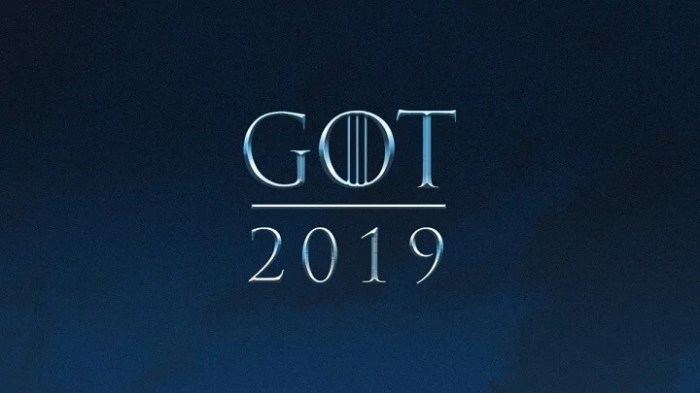Season 8 Premiere & Reception
The highly anticipated eighth and final season of Game of Thrones premiered on April 14, 2019, with an episode titled “Winterfell.” The premiere, like the entire season, garnered immense attention and generated a vast range of reactions from fans and critics.
The premiere episode was met with mixed reception. While some praised the episode’s stunning visuals, epic scope, and emotional impact, others criticized its pacing, character development, and the perceived rushed nature of the story.
Initial Fan Reactions
The initial fan reactions to the premiere episode were largely positive, with many viewers excited to see the long-awaited confrontation between the living and the dead. The episode’s opening sequence, depicting the arrival of Daenerys Targaryen and her allies at Winterfell, was particularly well-received. However, some viewers expressed concerns about the episode’s pacing, arguing that the story felt rushed and lacked the intricate character development that had defined previous seasons.
Major Plot Twists & Controversies
Game of Thrones’ final season was a whirlwind of shocking twists and turns, leaving fans and critics alike with mixed emotions. While some plot developments were met with applause, others ignited fierce debate and controversy, sparking heated discussions and even petitions to “undo” certain events. This section delves into the most controversial plot twists of season 8 and examines their impact on the show’s legacy.
The Night King’s Defeat
The highly anticipated clash between the living and the dead, the Battle of Winterfell, ultimately resulted in the demise of the Night King, the leader of the White Walkers. However, the manner of his defeat, at the hands of Arya Stark, felt anticlimactic to many viewers. The Night King, a seemingly invincible and terrifying antagonist, was vanquished with a single, swift blow, leaving some feeling that his defeat lacked the epic grandeur expected from such a momentous battle.
“The Night King’s defeat felt anticlimactic, like a whimper rather than a bang. It was a huge let-down, considering the build-up over the previous seasons.”
The swift defeat of the Night King also raised questions about the threat posed by the White Walkers. Their portrayal as an unstoppable force, capable of wiping out humanity, seemed to be undermined by their relatively easy demise.
“The Night King’s defeat felt rushed and unearned. It felt like a cheap trick to get rid of a major threat without exploring its full potential.”
Daenerys Targaryen’s Turn to Madness
One of the most controversial plot twists in season 8 was Daenerys Targaryen’s descent into madness and her subsequent burning of King’s Landing. After years of fighting for liberation and justice, Daenerys, the beloved “Mother of Dragons,” turned into a ruthless tyrant, incinerating innocent civilians and becoming the very monster she sought to destroy.
“Daenerys’s transformation from liberator to tyrant was jarring and sudden. It felt like a betrayal of her character arc and a cheap way to create conflict.”
This shocking turn of events left fans grappling with the complexities of power and the potential for good intentions to be corrupted. Many felt that Daenerys’s descent into madness was poorly executed, lacking the nuanced development that characterized her character throughout the series.
“The show’s writers seemed to have forgotten Daenerys’s previous struggles and motivations. Her turn to madness felt like a convenient plot device rather than a natural progression of her character.”
Bran Stark’s Ascension to the Iron Throne
The final episode of Game of Thrones concluded with Bran Stark, the enigmatic Three-Eyed Raven, being crowned King of the Six Kingdoms. This unexpected choice surprised many viewers, as Bran had been relatively passive throughout the series and lacked the charisma or ambition typically associated with a ruler.
“Bran’s ascension to the Iron Throne felt like a cop-out. He was a bland and uninteresting character, lacking the qualities needed to be an effective leader.”
The decision to make Bran the King raised questions about the show’s thematic focus. Some felt that the choice was a cynical attempt to subvert audience expectations, while others argued that it was a fitting conclusion to a series that emphasized the complexities of power and the cyclical nature of history.
“Bran’s coronation felt like a hollow victory. It was a reminder that power doesn’t always go to those who deserve it, but rather to those who are most cunning or ruthless.”
Character Development & Arcs: Game Of Thrones Season 8 2019 Confirmed
Season 8 of Game of Thrones saw the culmination of years of character development, with some characters experiencing significant shifts in their motivations and actions, while others remained consistent with their core beliefs. The season explored themes of power, betrayal, love, and loss, shaping the arcs of the key players in the narrative.
Daenerys Targaryen’s Descent into Madness
Daenerys Targaryen’s journey in season 8 is arguably the most complex and controversial. Throughout the series, she had been portrayed as a liberator, a champion of the oppressed, and a potential ruler with a strong moral compass. However, in season 8, she undergoes a dramatic transformation, culminating in the burning of King’s Landing and the death of countless innocent civilians.
Daenerys’s descent into madness can be attributed to several factors. The loss of her closest advisors, like Missandei and Jorah Mormont, coupled with the betrayal of Jon Snow, who revealed his true lineage, eroded her trust and sense of security. Her desire for vengeance against Cersei Lannister, who had orchestrated the deaths of her loved ones, fueled her rage.
Moreover, Daenerys’s unwavering belief in her own destiny as the rightful heir to the Iron Throne, combined with the weight of her lineage, may have contributed to her increasingly tyrannical behavior. The sight of Jon’s claim to the throne, coupled with his refusal to bend the knee, likely solidified her conviction that she was destined to rule, even if it meant resorting to extreme measures.
Daenerys’s arc in season 8 raises questions about the nature of power and the corrupting influence it can have on even the most well-intentioned individuals. Her transformation serves as a stark reminder that the pursuit of power can lead to a loss of empathy and a willingness to commit atrocities in the name of achieving one’s goals.
Themes & Symbolism
Season 8 of Game of Thrones, while controversial, continued to explore the complex themes and symbolism that had defined the series from its inception. This season, however, saw these themes reach their climax, culminating in a final battle for the fate of Westeros and the future of humanity.
Power and Corruption
The theme of power and its corrupting influence was a central element of Season 8. The characters’ struggle for power, their willingness to betray and manipulate others, and the ultimate consequences of their actions highlighted the dangers of unchecked ambition.
- Daenerys Targaryen’s descent into tyranny, fueled by her desire to break the wheel of power, ultimately led to her downfall. Her burning of King’s Landing, a horrific act of violence, demonstrated the corrupting nature of absolute power.
- Cersei Lannister, consumed by her lust for power, engaged in ruthless acts of violence and betrayal, ultimately leading to her demise. Her obsession with maintaining control blinded her to the true threat posed by the Night King.
Betrayal and Trust, Game of thrones season 8 2019 confirmed
Betrayal and the fragility of trust were recurring themes throughout Season 8. Characters were forced to confront the consequences of their choices and the limitations of their alliances.
- The betrayal of Jon Snow by his own family, who saw him as a threat to their claim to the Iron Throne, highlighted the complex nature of loyalty and the dangers of ambition.
- The Night King’s army, composed of the dead, represented the ultimate betrayal of life and the fragility of the human spirit. Their relentless pursuit of destruction underscored the inherent vulnerability of humanity in the face of overwhelming forces.
Destiny and Free Will
The season explored the interplay between destiny and free will, questioning whether individuals have control over their own fate or are merely pawns in a larger cosmic game.
- The prophecy of the Prince That Was Promised, which had been a driving force throughout the series, was ultimately fulfilled in a complex and unexpected way. Jon Snow’s role as the savior of humanity was a testament to the power of destiny, but his actions and choices ultimately shaped the outcome.
- Bran Stark’s ascension to the Iron Throne, a seemingly unlikely outcome, suggested that fate can be unpredictable and that even seemingly insignificant individuals can play a crucial role in shaping the future.
Symbolism
Symbolism played a significant role in Season 8, enriching the narrative and adding layers of meaning to the events unfolding on screen.
- The Iron Throne, a symbol of power and ambition, was ultimately destroyed, signifying the end of an era and the potential for a new beginning. Its destruction represented the rejection of the old ways of ruling and the hope for a more just and equitable future.
- The dragons, representing both power and destruction, played a pivotal role in the season. Daenerys’s dragons, Drogon, Rhaegal, and Viserion, symbolized her ambition and her ultimate downfall. The loss of Rhaegal and the resurrection of Viserion as a wight underscored the vulnerability of even the most powerful beings.
Impact on the Series & Legacy
Season 8 of Game of Thrones has had a profound and enduring impact on the franchise, leaving its mark on both the show’s legacy and the cultural landscape. While the final season garnered mixed reactions, its controversial aspects and the show’s overall cultural influence have cemented its place in television history.
Impact on the Series
The final season’s controversial plot points and pacing significantly impacted fan perception of the series. Many viewers felt that the ending was rushed and unsatisfying, particularly regarding the fates of beloved characters and the resolution of major plotlines. The criticism intensified online, leading to a widespread debate about the quality of the final season and its impact on the show’s overall legacy.
Cultural Impact
Despite the criticisms, Game of Thrones remains a cultural phenomenon. The show’s popularity propelled the fantasy genre to new heights, inspiring numerous adaptations and spin-offs. The series’ iconic imagery, dialogue, and characters have become ingrained in popular culture, influencing fashion, music, and even political discourse.
Fan Perception
The reception to season 8 has been polarized, with some fans praising the show’s ambition and concluding moments while others remain critical of its execution. The controversy surrounding the season has sparked a broader discussion about fan expectations, the role of adaptation in storytelling, and the evolving nature of fandom in the digital age.
Game of thrones season 8 2019 confirmed – Season 8 of Game of Thrones stands as a testament to the show’s enduring popularity and its ability to spark conversation. The controversial twists and turns, the unexpected character development, and the lingering questions about the ending have all contributed to the show’s enduring legacy. Whether you loved it or hated it, season 8 undoubtedly left a mark on the cultural landscape, solidifying Game of Thrones as one of the most influential television series of all time. It’s a show that will continue to be debated and analyzed for years to come, prompting fans to revisit the series and ponder its complex themes and characters.
Remember the epic Game of Thrones Season 8 finale in 2019? Well, it turns out that even Microsoft, the company that brought us Windows, isn’t opposed to the idea of an open-sourced operating system one day, as they recently revealed. It’s like the Iron Throne, only instead of vying for power, they’re vying for collaboration. Maybe a future Game of Thrones season could be about a world where software is completely open source – now that’s a plot twist!
 Standi Techno News
Standi Techno News

